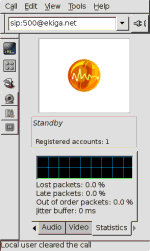Ekiga
Vox Libertas
2006-05-04
Voice over IP (VoIP) has seen an enormous boom recently. Saving costs by routing calls via the Internet or by using software based solutions instead of expensive hardware has been the driving factor. Ekiga, the application formerly known as GnomeMeeting, is the answer of the free software community to these needs. In contrast to GnomeMeeting, Ekiga supports the Session Initiation Protocol (SIP) and can handle multiple H.323 and SIP accounts at the same time.
There are several different protocols in the VoIP arena. The oldest is H.323 which was developed by the International Telecommunication Union (ITU). The protocol isn't especially firewall-friendly, i.e. there are multiple dynamically chosen port numbers. SIP is slightly better in this respect and it is used in many hardware VoIP phones. Another interesting protocol is IAX2, developed by the Asterisk project, since it communicates only over a single UDP port. However, only few clients support it. Also worth mentioning is the proprietary Skype protocol, which has some serious security implications according to what researchers presented at the Black Hat Europe 2006 conference (PDF) . Skype clients can be abused for port scanning, distributed Denial of Service (dDoS) attacks and other unpleasant things.
Ekiga supports both H.323 and SIP. To circumvent the problems faced when dealing with Network Address Translation (NAT) an STUN server can be used. However this won't work in a properly firewalled environment. In this case, you usually end up with running a separate H.323 or SIP proxy.
Since the first release of Ekiga came out only a few weeks ago hardly any GNU/Linux distribution offers binary packages. However, the project itself offers them for every major distribution. If you decide to use one of them, make sure that you have the latest libraries needed by Ekiga installed as well or you will run into trouble.
 |
Ekiga's main window |
When Ekiga is launched for the first time it asks the user a few questions and then shows the main window. From there you can make outgoing calls or tune how to react to incoming calls. Ekiga supports transferring calls immediately or after a certain delay. The default behavior is to display a pop-up window upon an incoming call. Unfortunately the window is active immediately, meaning that you can erroneously accept or reject a call depending on what you are typing or where you are clicking when the call comes in. Disabling the buttons for a few seconds would be really helpful here.
Ekiga supports both audio and video communication. Setting up video devices is dead easy if they are supported by the Video4Linux drivers. Participation in conferences is possible but requires an additional Multipoint Control Unit (MCU). MCUs are available as hardware or software, the OpenH323 project offers a free implementation called OpenMCU. Even although extensions to H.323 and SIP now allow to encrypt calls Ekiga currently does not support it. A text chat function is also available.
In contrast to many other VoIP suites Ekiga can register to several different SIP registrars and H.323 gatekeepers at the same time. These services provide a mapping from SIP and H.323 URLs (the equivalent to a phone number) to the IP address of said user. To find out someone's SIP or H.323 URL Ekiga can ask LDAP and ILS servers.
In summary, Ekiga should serve all your VoIP needs. And with the widespread adoption of VoIP you can expect it to become even better.
| |||||||||||||||||||||||||||||||
Copyright 2006–2008 OS Reviews. This document is available under the terms of the GNU Free Documentation License. See the licensing terms for further details.
